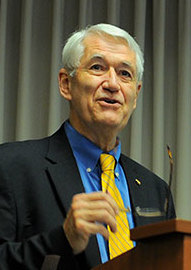Robert J. Birgeneau facts for kids
Quick facts for kids
Robert J. Birgeneau
|
|
|---|---|

Birgeneau in May 2016
|
|
| 9th Chancellor of the University of California, Berkeley | |
| In office 2004–2013 |
|
| Preceded by | Robert Berdahl |
| Succeeded by | Nicholas Dirks |
| 14th President of the University of Toronto | |
| In office 2000–2004 |
|
| Chancellor | Hal Jackman Vivienne Poy |
| Preceded by | Robert Prichard |
| Succeeded by | David Naylor |
| Personal details | |
| Born |
Robert Joseph Birgeneau
March 25, 1942 Toronto, Ontario, Canada |
| Spouse | Mary Catherine Birgeneau |
| Education | University of Toronto (BSc) Yale University (PhD) |
| Awards | Founders Award, American Academy of Arts & Sciences |
| Scientific career | |
| Fields | Physics |
| Institutions | |
| Thesis | Magnetic interactions in rare earth insulators (1967) |
| Doctoral advisor | Werner P. Wolf |
| Doctoral students |
|
Robert Joseph Birgeneau (born March 25, 1942) is a Canadian-American physicist and a leader in universities. He served as the 14th president of the University of Toronto from 2000 to 2004. Later, he became the 9th chancellor of the University of California, Berkeley from 2004 to 2013.
Contents
Robert Birgeneau's Early Life and Education
Robert Birgeneau was the first person in his family to finish high school. He graduated from St. Michael's College School in Toronto. In 1963, he earned a B.Sc degree in mathematics. He studied at St. Michael's College in the University of Toronto.
While at the University of Toronto, he met his wife, Mary Catherine. They have four children together. Robert Birgeneau then went on to earn his Ph.D in physics from Yale University in 1966. His Ph.D. research focused on "Magnetic Interactions in Rare-Earth Insulators."
Early Career in Physics
After finishing his Ph.D., Birgeneau spent a year teaching at Yale University. He then spent another year teaching at the University of Oxford in England. From 1968 to 1975, he worked as a scientist at AT&T Bell Laboratories. This is a famous research and development company.
Leadership Roles in Universities
Robert Birgeneau has held important leadership positions at several major universities. He helped guide these institutions and support students.
Time at MIT
After his work at Bell Laboratories, he joined the Massachusetts Institute of Technology (MIT). He became a physics professor there. During his 25 years at MIT, he took on more leadership roles. He served as the Chair of the Physics Department. Later, he became the Dean of Science, overseeing many science programs.
Leading the University of Toronto
From 2000 to 2004, Robert Birgeneau served as the President of the University of Toronto. This is one of Canada's largest universities. He was originally expected to serve for seven years. However, he left after only four years. His departure caused some discussion at the time.
Becoming Chancellor at UC Berkeley
In 2004, Robert Birgeneau was chosen to be the 9th chancellor of the University of California, Berkeley. This is a very well-known university in the United States. He was recommended for this role by Robert Dynes. Dynes was the president of the UC system and had worked with Birgeneau before.
Supporting Students and Policies
As Chancellor, Birgeneau used his position to speak about important topics. He supported policies that he believed would help students and the university. For example, he spoke out against a boycott of Israeli academic institutions. He also encouraged people to vote against a measure that would have removed the right for same-sex couples to marry in California.
He also supported the California Dream Act. This act helps students who are undocumented get financial aid for college. He also supported changes to property tax laws. These changes would provide more funding for social services and education. He also wanted to bring back affirmative action. This would help increase diversity in public universities.
Middle Class Access Plan
During his time at UC Berkeley, Birgeneau introduced a new financial aid program. It was called the Berkeley Middle Class Access Plan (MCAP). This plan helped middle-income families afford college. It limited the total cost of education for eligible students. This included tuition, fees, room, board, and books. The cost was capped at 15 percent of the family's total income.
Families earning between $80,000 and $140,000 per year could qualify. This program started in the fall of 2012. It was the first program of its kind in the UC system to specifically help middle-class families. It also inspired a similar statewide program in California.
Robert Birgeneau finished his term as chancellor of UC Berkeley on June 1, 2013. Nicholas Dirks took over the role after him.
 | Laphonza Butler |
 | Daisy Bates |
 | Elizabeth Piper Ensley |

